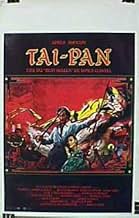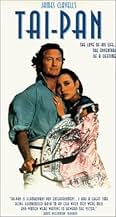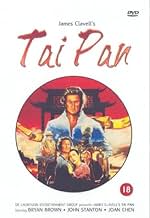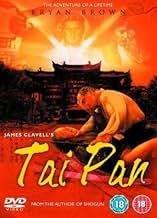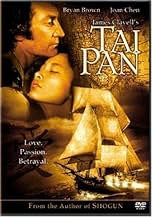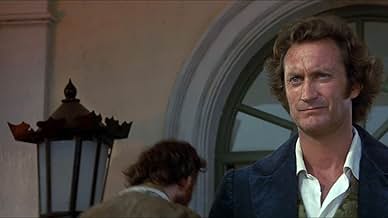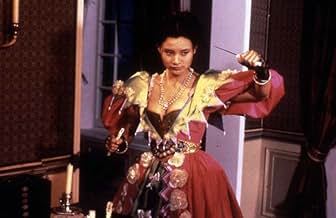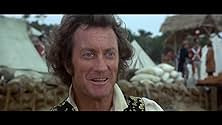VALUTAZIONE IMDb
5,6/10
2055
LA TUA VALUTAZIONE
Aggiungi una trama nella tua linguaHistorical fiction set against the backdrop of Hong Kong in its early years of British rule.Historical fiction set against the backdrop of Hong Kong in its early years of British rule.Historical fiction set against the backdrop of Hong Kong in its early years of British rule.
- Regia
- Sceneggiatura
- Star
- Premi
- 2 candidature totali
Recensioni in evidenza
Tai-Pan was probably too ambitious an undertaking for a film as short as just over 2 hours. Maybe a mini-series would have been the answer, but Tai-Pan certainly had the potential to be an oriental Gone With The Wind.
Unrealized potential though it is. The screenplay made many references to previous events in the novel that are not shown here. We do know there's one nasty rivalry going on between Bryan Brown and John Stanton who both rose to wealth in the China trade like the protagonists in an Edna Ferber novel.
Bryan Brown is the Far East version of Rhett Butler. He's built the family fortune on legal trade and illegal trade in opium. Not that opium was unknown before the British and other European powers got there, but they did turn it into a thriving business. When the Chinese government objected, the European powers took nibbles out of a prostrate and weakened state.
One of those nibbles the British took was Hong Kong, spoils from the Opium War of 1841. Brown like Margaret Mitchell's Rhett Butler or the hero of many Edna Ferber books is the guy who builds what became one of the busiest trading centers on the globe.
Unlike his rival Stanton, Brown's wife left him and took their small son back to the United Kingdom. Brown didn't mourn he took up with some Chinese women, they were pawns in various business negotiations. He got a son, Russell Wong, from one of them.
Things get interesting when his other son arrives from Great Britain played by Tim Guinee. He's a rather uptight Victorian youth who is not pleased with the debauchery he finds and his father's part in it.
Tai-Pan is exquisitely photographed with the climatic typhoon scene very well done indeed. A better screenplay would have been needed to tell this epic story.
Unrealized potential though it is. The screenplay made many references to previous events in the novel that are not shown here. We do know there's one nasty rivalry going on between Bryan Brown and John Stanton who both rose to wealth in the China trade like the protagonists in an Edna Ferber novel.
Bryan Brown is the Far East version of Rhett Butler. He's built the family fortune on legal trade and illegal trade in opium. Not that opium was unknown before the British and other European powers got there, but they did turn it into a thriving business. When the Chinese government objected, the European powers took nibbles out of a prostrate and weakened state.
One of those nibbles the British took was Hong Kong, spoils from the Opium War of 1841. Brown like Margaret Mitchell's Rhett Butler or the hero of many Edna Ferber books is the guy who builds what became one of the busiest trading centers on the globe.
Unlike his rival Stanton, Brown's wife left him and took their small son back to the United Kingdom. Brown didn't mourn he took up with some Chinese women, they were pawns in various business negotiations. He got a son, Russell Wong, from one of them.
Things get interesting when his other son arrives from Great Britain played by Tim Guinee. He's a rather uptight Victorian youth who is not pleased with the debauchery he finds and his father's part in it.
Tai-Pan is exquisitely photographed with the climatic typhoon scene very well done indeed. A better screenplay would have been needed to tell this epic story.
I agree with other comments that this should have been a miniseries but on HBO not commercial TV. The scenes with the various women would have been destroyed with censorship. I believe that it did give an accurate "feel" to the times and events depicted.
Upon viewing this I immediately ordered the book ( I had ignored it due to some disappointment at Nobel House ). Also bit the bullet and ordered Shogun the miniseries. Mr. Clavell's work s are to be appreciated even in movies that fall short. I do wish Bryan Brown had a better accent but Joan Chen mimicked it perfectly.
The supporting cast both western and oriental were excellent. Also the "few" ships used were great. Now I want Noble House on DVD.
Upon viewing this I immediately ordered the book ( I had ignored it due to some disappointment at Nobel House ). Also bit the bullet and ordered Shogun the miniseries. Mr. Clavell's work s are to be appreciated even in movies that fall short. I do wish Bryan Brown had a better accent but Joan Chen mimicked it perfectly.
The supporting cast both western and oriental were excellent. Also the "few" ships used were great. Now I want Noble House on DVD.
Adventure film based on James Clavell's novel about a 19th-century trade baron who makes his headquarters in Hong Kong. This is the 3rd worst motion picture I've ever seen in a theater (behind Rebel and Dune.) It seemed that the original intention was to have made this as a TV mini series and not for theatrical release. One point in the film Bryan Browns character Dirk Struan tells another male character "When you make dung you'll wipe your arse with paper". The entire theater crowd erupted in laughter for about five minutes and it appeared that the line was not intended to be humorous. That's how bad this movie was.
As a movie reviewer for my college newspaper, I often was told: "You've got a great job, you get paid to go to movies." My standard answer was: "It's not that great - I had to sit through 'Tai-Pan'." The only movie that has given me more pain was "Ishtar."
It's worth pointing out that I came to this film having read James Clavell's excellent novel, TAI-PAN, on which this is based. If I hadn't read the book beforehand, I probably would have enjoyed this adaptation a lot more.
Sadly, I was left feeling that the filmed TAI-PAN is a crushing disappointment, purely because it cuts so very much out of the story. The whole background is missing, the Triad stuff, the politics, the trade with the Chinese. The story is reduced to the human relationships and particularly the family rivalries between the main characters, but there was so much more to it than that.
I do understand that films are very different to books and that adaptations have to cut material out, but TAI-PAN has a two hour running time and a lot of it is slow-paced. If it had told events at a much faster pace, it would have been able to include a lot more of the details and subtleties that are missing here. As it is, there are elements of greatness - plus the novelty of seeing Bryan Brown in a leading role - but it could have been so much more. A miniseries would suffice better, I think.
Sadly, I was left feeling that the filmed TAI-PAN is a crushing disappointment, purely because it cuts so very much out of the story. The whole background is missing, the Triad stuff, the politics, the trade with the Chinese. The story is reduced to the human relationships and particularly the family rivalries between the main characters, but there was so much more to it than that.
I do understand that films are very different to books and that adaptations have to cut material out, but TAI-PAN has a two hour running time and a lot of it is slow-paced. If it had told events at a much faster pace, it would have been able to include a lot more of the details and subtleties that are missing here. As it is, there are elements of greatness - plus the novelty of seeing Bryan Brown in a leading role - but it could have been so much more. A miniseries would suffice better, I think.
Lo sapevi?
- QuizProducer Martin Ransohoff and the Metro-Goldwyn-Mayer studio in 1966 acquired the rights to James Clavell's source "Tai-Pan" novel for US $500,000. The movie was then announced by MGM in 1967-68 to star Patrick McGoohan to play Dirk Struan, to be directed by Michael Anderson, with source novelist Clavell writing the screenplay. The picture was originally budgeted to cost US $26 million which was then reduced to US $20 million. The project sat around stagnant for a time in development hell. However, after severe operating losses, the epic was one of a number of expensive projects the new management at the MGM studio dropped as being too costly. The project and the development of the movie at MGM was in the end canceled by executive James T. Aubrey.
- BlooperIn a scene, set in 1841, several of the ladies were wearing bright mauve outfits. That would have been most unlikely for the wives of middle class traders at that time as the color purple was prohibitively expensive before the invention of analine dyes in London - in 1856. By 1870 these gaudy colors had become so cheap and commonplace that it became a status symbol to mimic the subtler, paler colors of the pre analine dye days.
- Citazioni
Dirk Struan: No emperor has seen the guns of a British man-of-war.
I più visti
Accedi per valutare e creare un elenco di titoli salvati per ottenere consigli personalizzati
- How long is Tai-Pan?Powered by Alexa
Dettagli
Botteghino
- Budget
- 25.000.000 USD (previsto)
- Lordo Stati Uniti e Canada
- 4.007.250 USD
- Fine settimana di apertura Stati Uniti e Canada
- 1.863.469 USD
- 9 nov 1986
- Lordo in tutto il mondo
- 4.007.250 USD
- Tempo di esecuzione
- 2h 7min(127 min)
- Mix di suoni
- Proporzioni
- 2.35 : 1
Contribuisci a questa pagina
Suggerisci una modifica o aggiungi i contenuti mancanti

